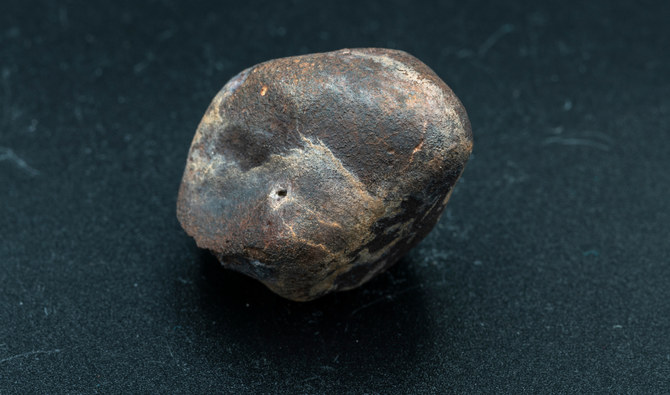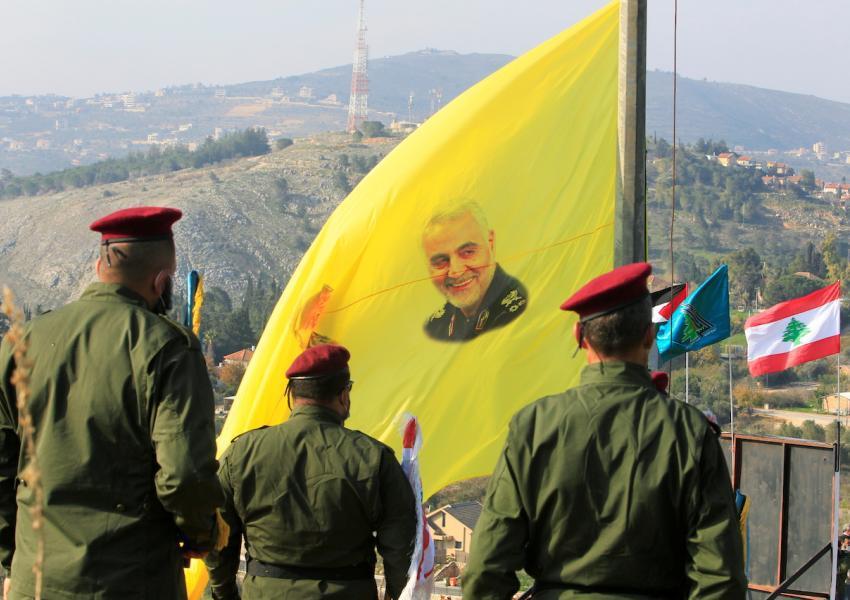
BEIRUT (AP) — Drenched in sweat, doctors check patients lying on stretchers in the reception area of Lebanon’s largest public hospital. Air conditioners are turned off, except in operating rooms and storage units, to save on fuel. Medics scramble to find alternatives to saline solutions after the hospital ran out. The shortages are overwhelming, the medical staff exhausted. And with a new surge in coronavirus cases, Lebanon’s hospitals are at a breaking point. The country’s health sector is a casualty of the multiple crises that have plunged Lebanon into a downward spiral — a financial and economic meltdown, compounded by a complete failure of the government, runaway corruption and a pandemic that isn’t going away. The collapse is all the more dramatic since only a few years ago, Lebanon was a leader in medical care in the Arab world. The region’s rich and famous came to this small Mideast nation of 6 million for everything, from major hospital procedures to plastic surgeries.
THE NEW NORMAL
Ghaidaa al-Saddik, a second-year resident, had just returned from a week off after an exhausting year. Back on duty for a week, she has already intubated two critical patients in the emergency room, both in their 30s. She struggles to admit new patients, knowing how short on supplies the hospital is, scared to be blamed for mistakes and questioning if she is doing her best. Many patients are asked to bring their own medicines, such as steroids. Others are discharged too soon — often to homes where power outages last for days. “You feel like you are trapped,” said al-Saddik. The 28-year-old spends more nights in the staff dorms studying because at home, she has no electricity. She moved to an apartment closer to the hospital that she shares with two other people to save on rent and transportation. With the collapse of Lebanon’s currency amid the crisis, her salary has lost nearly 90% of its value. With fewer and fewer residents, she must now do the rounds for about 30 patients, instead of 10. Her mentor, a senior virologist, has left Lebanon — one of many in a brain drain of medical professionals. “I want to help my people,” she said. “But at the same time, what about me being a better doctor?” ___
RUNNING ON EMPTY

By Najia Houssari -- arabnews.com -- BEIRUT: The “Hermel meteorite” is continuing to generate controversy in Lebanon, becoming a top trend on several social media platforms. In Hermel, a town in the Baalbek-Hermel governorate 143 km from Beirut, a man claiming to be from NASA has reportedly discovered a 4,000-year-old meteorite worth billions of dollars. The Lebanese have reacted skeptically, with one beleaguered member of the public saying: “Amid the countless crises, all Lebanon was missing was a meteorite falling.” It has been claimed that “a geological engineer with US citizenship came to Lebanon about a year ago and headed to Hermel, which is 780 meters above sea level, with the help of a GPS and an interpreter.” Reports added that “he got to a specific geographical area located on a property owned by a person who was out of town so he asked the municipality to complete the official procedures so that he could return with others to search for a meteorite that fell there about 4,000 years ago.” The engineer allegedly explained that the meteorite “may be the largest to hit the Middle East, leaving a hole with a diameter of about 130 meters, and if it is extracted, it will have an important scientific value and science museums can be established at the site.”
Residents in Hermel said NASA “detected radioactive materials in one of the properties surrounding the site.” The mayor of Hermel, Sobhi Saqr, began searching for the property owner, Camille Nadim Murad, whose residence and address are unknown. In July, he published an announcement in the Official Gazette, informing him that work would be carried out “urgently for the public interest on property No. 2604.” He asked the person concerned to communicate with the municipality, stressing that the works would not change the property’s features or lower its value. The excavations, which began at the site without the permission of the property owner, sparked a controversy on social media. The mayor was accused of “fraud and greed and of working in secret at the property in the hope of making huge profits.” It was reported that “one gram of the meteorite is worth $4,000 to $8,000, and if the meteorite is found at a depth of 12 meters, its value will reach billions of dollars, while it is estimated to weigh 12 tons, according to preliminary studies by scientists.” No research center has followed up on the matter or visited the area.
by National News Agency — Maronite Patriarch Bechara Rahi urged officials to stop torturing and manipulating citizens’ feelings and put an end …

this is an opinion article written by Bryan E. Leib & Maria Maalouf -- the opinions are not necessarily views of khazen.org
The combination of Ebrahim Raisi (Raeesi) taking power in Iran and the weakness coming from President Joe Biden could lead to a major conflict between Hezbollah and Israel, a conflict in which many innocent lives would be lost on both sides. Hezbollah has a lot to be celebrating these days. Inside Lebanon, it is celebrating its victory in further entrenching itself in all facets of Lebanon’s government with the recent appointment of Najib Mikati as the next Prime Minister of Lebanon(link is external), supported by Hezbollah. This Iranian-backed “political party” which in fact is a US designated FTO (foreign terrorist organization) is also celebrating the presidency of a hardliner in Iran. During Raisi’s inauguration, the deputy secretary-general of Hezbollah shared the front row with other senior officials from US designated FTO’s such as Hamas and Palestinian Jihad. With Raisi taking power, we predict that Hezbollah will continue its strong-arm tactics inside Lebanon, on Israel’s northern border, and look to further expand its grip on power throughout the Middle East because that is what proxies do - they listen to their boss. Let us be clear - Hezbollah doesn’t make any significant moves without securing Iran’s blessing. They do what they are told because if they don’t, they know that Tehran will cut off the flow of money and weapons.
Iran’s Supreme Leader Ali Khamenei has a vision for the Middle East, and he executes this vision through militant proxies. The sad reality is that the Islamic Republic of Iran seeks to push the entire region into further chaos and into a protracted war with Israel. All of Iran’s terrorist proxies share in Tehran’s vision to eradicate Israel and create chaos in the region. The silent sympathy of President Michel Aoun is a testimony to the inability of any Lebanese political force to stop this dangerous Hezbollah-Iran nexus that has stripped the country of its sovereignty and plunged it into a death spiral. Meanwhile, the Biden administration and the French government have called on Israel and Hezbollah to exercise restraint and refrain from military escalation. These words have not been backed up by tangible actions. Immediately after these calls for restraint, Hezbollah leader Hassan Nasrallah declared that the current dynamic between his militant organization and Israel is a throwback to 2006, which witnessed the last serious military confrontation between the two. In addition, Nasrallah’s deputy, Naiim Qassem, met with the Commander-in-Chief of the Islamic Revolutionary Guard Corps (IRGC) Hossein Salami, and reiterated that, “the grounds now are ready for the collapse of the Zionist entity. If any error is committed on its [Israel’s] part, the new war will be launched, and it will be the death war for it.”
Hezbollah is signaling to its patron in Tehran that they are ready, willing and able to launch an attack on Israel. This should come as no surprise to anyone because with Raisi taking power, Tehran’s support for Hezbollah might be increasing. After all, Raisi a hardliner who is loyal to Khamenei. While these reckless and dangerous statements are threatening to drive Lebanon into a state of chaos, the possibility of a political-economic recovery has been diminishing as well, as the country is pushed further into Iran’s orbit. Hezbollah is funded by Tehran, and the Islamic Republic spends anywhere from $500 million to $1 billion annually on its apparatus and operations. This is a significant increase from the $100 million it used to receive from Iran in the 1980s. In addition, Hezbollah has been capable of freezing the economy and society in Lebanon by challenging the government and ultimately deciding who the next prime minister should be.
Khazen History


Historical Feature:
Churches and Monasteries of the Khazen family

St. Anthony of Padua Church in Ballouneh
Mar Abda Church in Bakaatit Kanaan
Saint Michael Church in Bkaatouta
Saint Therese Church in Qolayaat
Saint Simeon Stylites (مار سمعان العامودي) Church In Ajaltoun
Virgin Mary Church (سيدة المعونات) in Sheilé
Assumption of Mary Church in Ballouneh
1 - The sword of the Maronite Prince
2 - LES KHAZEN CONSULS DE FRANCE
3 - LES MARONITES & LES KHAZEN
4 - LES MAAN & LES KHAZEN
5 - ORIGINE DE LA FAMILLE
Population Movements to Keserwan - The Khazens and The Maans
ما جاء عن الثورة في المقاطعة الكسروانية
ثورة أهالي كسروان على المشايخ الخوازنة وأسبابها
Origins of the "Prince of Maronite" Title
Growing diversity: the Khazin sheiks and the clergy in the first decades of the 18th century
Historical Members:
Barbar Beik El Khazen [English]
Patriach Toubia Kaiss El Khazen(Biography & Life Part1 Part2) (Arabic)
Patriach Youssef Dargham El Khazen (Cont'd)
Cheikh Bishara Jafal El Khazen
Patriarch Youssef Raji El Khazen
The Martyrs Cheikh Philippe & Cheikh Farid El Khazen
Cheikh Nawfal El Khazen (Consul De France)
Cheikh Hossun El Khazen (Consul De France)
Cheikh Abou-Nawfal El Khazen (Consul De France)
Cheikh Francis Abee Nader & his son Yousef
Cheikh Abou-Kanso El Khazen (Consul De France)
Cheikh Abou Nader El Khazen
Cheikh Chafic El Khazen
Cheikh Keserwan El Khazen
Cheikh Serhal El Khazen [English]
Cheikh Rafiq El Khazen [English]
Cheikh Hanna El Khazen
Cheikha Arzi El Khazen
Marie El Khazen